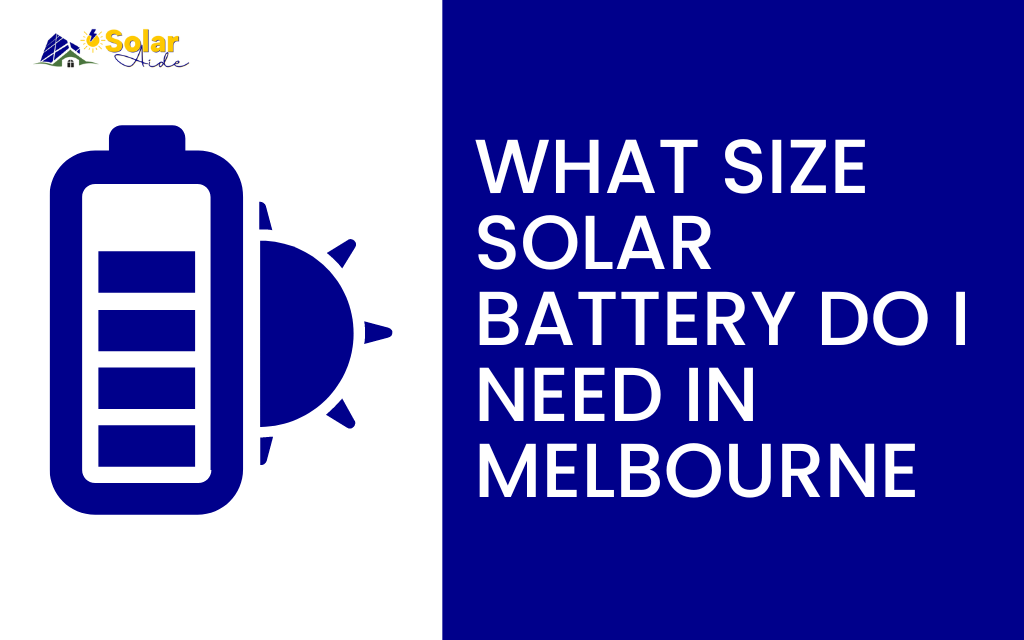Are you tired of soaring electricity bills? Thinking about going green and saving money? Solar batteries could be your answer. If you’re a homeowner in Melbourne considering solar energy, knowing the right size battery for your needs is essential. This guide will help you understand everything from calculating energy consumption to choosing the right battery type. Let’s get started!
Why Solar Batteries Matter
Solar batteries are becoming increasingly popular among Melbourne homeowners. With rising energy costs and frequent power outages, having a reliable source of backup power is invaluable. Solar batteries store excess energy generated by your solar panels during the day, making it available for use at night or during cloudy days. This not only ensures a consistent power supply but also maximizes the benefits of your solar system.
Benefits of Using Solar Batteries in Melbourne
There are numerous benefits to installing solar batteries in your Melbourne home:
- Energy Independence: Reduce your reliance on the grid and protect yourself from rising energy prices.
- Backup Power: Ensure that your home remains powered during outages.
- Environmental Impact: Lower your carbon footprint by utilizing stored solar energy.
- Financial Savings: Save on energy bills by using stored energy instead of purchasing electricity from the grid.
Factors Influencing Solar Battery Size
Choosing the right size solar battery involves several factors that are crucial for ensuring optimal performance.
Household Energy Consumption
Understanding your household’s energy consumption is the first step. Check your electricity bills to see how much energy you use daily, monthly, and annually. This will give you a clear picture of your energy needs.
Solar Panel System Size
The size of your solar panel system directly affects the amount of energy you generate and store. Larger systems produce more energy, which means you may need a bigger battery to store the excess power.
Energy Usage Patterns
Your energy usage patterns also play a significant role. Do you use more energy during the day when the sun is shining or at night? Understanding whether you’re a daytime or nighttime energy user will help determine the best battery size for your needs.
Understanding Energy Consumption
Accurately calculating your energy consumption is vital for choosing the right battery size.
Calculating Daily Energy Consumption
Start by calculating your household’s daily energy consumption. This can be done by averaging your monthly usage and dividing it by 30. For example, if your monthly usage is 900 kWh, your daily consumption would be 30 kWh.
Peak Energy Usage Times
Identify the times of day when your energy usage peaks. This will help you understand when you need the most power and how much energy you need to store to cover these peak times.
Seasonal Variations in Energy Needs
Energy consumption can vary with the seasons. For instance, you may use more electricity in winter for heating or in summer for cooling. Take these variations into account when determining your battery size.
Types of Solar Batteries
There are several types of solar batteries available, each with its pros and cons.
Lead-Acid Batteries
Lead-acid batteries are one of the oldest types and are known for their reliability and affordability. However, they have a shorter lifespan and lower efficiency compared to newer types.
Lithium-Ion Batteries
Lithium-ion batteries are the most popular choice for solar systems today. They have a longer lifespan, higher efficiency, and require less maintenance. However, they tend to be more expensive upfront.
Pros and Cons of Each Type
- Lead-Acid Batteries:
- Pros: Affordable, reliable
- Cons: Shorter lifespan, lower efficiency
- Lithium-Ion Batteries:
- Pros: Longer lifespan, higher efficiency, lower maintenance
- Cons: Higher initial cost
Battery Capacity and Power Output
Understanding battery capacity and power output is essential for matching your energy needs.
Explanation of Kilowatt-Hours (kWh) and Amp-Hours (Ah)
Battery capacity is often measured in kilowatt-hours (kWh) or amp-hours (Ah). kWh indicates the amount of energy a battery can store, while Ah measures the flow of electric charge over time.
Matching Battery Capacity to Energy Needs
To determine the battery capacity you need, match it to your daily energy consumption. If your daily consumption is 30 kWh, you’ll need a battery that can store at least that amount.
Understanding Power Output and Discharge Rates
Power output and discharge rates indicate how quickly a battery can release stored energy. Ensure your battery can handle your peak power demands without losing efficiency.
Energy Storage Goals
Your goals for energy storage will also impact your choice of battery size.
Backup Power vs. Self-Consumption
Determine whether you need a battery primarily for backup power during outages or for self-consumption to minimize grid reliance. Backup power requires higher capacity and reliability.
Desired Autonomy
Decide how long you want to run on battery power alone. This will help you determine the necessary battery size to achieve your desired autonomy.
Sizing the Battery System
Here’s a step-by-step guide to help you calculate the required battery size.
Step-by-Step Guide to Calculating Battery Size
- Calculate Daily Energy Needs: Determine your average daily energy consumption.
- Consider Peak Usage: Identify peak usage times and ensure your battery can meet these demands.
- Factor in Efficiency: Account for battery efficiency to avoid underestimating your needs.
Examples and Case Studies
Let’s look at a typical Melbourne household that uses 30 kWh daily. A lithium-ion battery with 95% efficiency would need to store around 31.5 kWh to cover daily needs (30 kWh / 0.95 = 31.5 kWh).
Solar Battery System Efficiency
Battery efficiency affects the overall performance and size requirements.
Round-Trip Efficiency of Batteries
Round-trip efficiency refers to the energy loss when charging and discharging a battery. Higher efficiency means less energy loss and better performance.
Impact of Efficiency on Battery Size
Account for efficiency when determining battery size. Choose batteries with higher round-trip efficiency to maximize the benefits.
Cost Considerations
Balancing initial costs with long-term savings is crucial when choosing a battery.
Initial Costs vs. Long-Term Savings
While lithium-ion batteries have higher upfront costs, their longer lifespan and efficiency can result in greater long-term savings compared to lead-acid batteries.
Return on Investment (ROI)
Calculate the ROI based on your energy savings over time. This will help you determine the most cost-effective option.
Compatibility with Solar Inverters
Ensure your battery is compatible with your existing solar inverter for optimal performance.
Ensuring Battery and Inverter Compatibility
Check the specifications of your battery and inverter to ensure they work together seamlessly.
Importance of Choosing the Right Inverter
The right inverter can enhance the performance of your battery system, ensuring efficient energy conversion and storage.
Local Regulations and Incentives
Melbourne-specific regulations and incentives can impact your decision.
Melbourne-Specific Regulations
Familiarize yourself with local regulations for solar battery installations to ensure compliance.
Available Incentives and Rebates
Take advantage of available incentives and rebates for solar battery storage to reduce costs.
Installation and Maintenance
Choosing a reputable installer and maintaining your battery system is vital.
Choosing a Reputable Installer
Work with experienced and certified installers to ensure a safe and efficient installation.
Maintenance Tips for Solar Batteries
Regularly check and maintain your battery system to extend its lifespan and ensure optimal performance.
Future-Proofing Your Battery System
Consider future energy needs and scalability when choosing a battery.
Considering Future Energy Needs
Anticipate future energy demands and choose a battery that can accommodate growth.
Upgrading and Expanding Battery Capacity
Select a battery system that allows for easy upgrades and expansions as your energy needs evolve.
Melbourne Solar Rebates
Taking advantage of solar rebates and incentives can significantly reduce the initial investment in solar battery storage systems. In Melbourne, the Victorian government offers several rebate programs designed to make renewable energy more accessible and affordable.
Solar Homes Program
The Victorian government’s Solar Homes Program provides rebates for the installation of solar PV panels, solar hot water systems, and solar batteries. Residential homeowners may be eligible for a rebate on the cost of installing solar battery systems, effectively lowering the upfront expenses.
- Learn more about the Solar Homes Program
Solar Battery Rebate
This specific rebate aims to assist households in installing battery storage, enhancing their energy resilience and reducing reliance on the grid. Eligible homeowners can receive rebates that cover a significant portion of the battery installation costs.- Detailed information on Solar Battery Rebates
Eligibility Criteria and Application Process
To qualify for these rebates, certain criteria must be met, including property ownership status, installation by an accredited provider, and compliance with safety standards. The application process is straightforward and can be completed online.- Check your eligibility and apply
Additional Incentives
In addition to state-specific programs, there may be other incentives and financing options available through local councils and federal initiatives. These can provide further financial support and benefits for those investing in solar batteries.- Explore additional incentives
By leveraging these rebates and incentives, Melbourne residents can make more economical choices in upgrading their home energy systems, ensuring long-term savings and sustainability. For more personalized advice or assistance in navigating these programs, consider contacting a local energy consultant or your solar system installer.
- Explore additional incentives
- Check your eligibility and apply
- Detailed information on Solar Battery Rebates
Conclusion
In summary, choosing the right size solar battery for your Melbourne home involves understanding your energy consumption, selecting the right battery type, and considering factors like efficiency and cost. By following this guide, you can make an informed decision that meets your energy needs and maximizes the benefits of solar energy.
Ready to take the next step? Contact Solaraide for personalized advice and installation services in Melbourne. Discover how the right solar battery can transform your home’s energy usage today!





